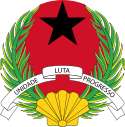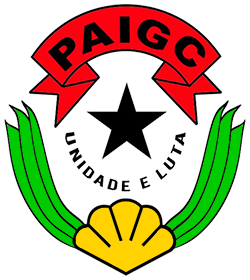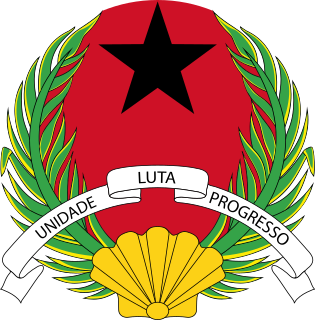 |
|---|
The New Democracy Party (Portuguese : Partido da Nova Democracia, PND) is a political party in Guinea-Bissau.
 |
|---|
The New Democracy Party (Portuguese : Partido da Nova Democracia, PND) is a political party in Guinea-Bissau.
The party was established by Mamadú Iaia Djaló in 2007. It won a single seat in the National People's Assembly in the 2008 elections. [1] In the 2009 presidential elections it nominated Djaló as its candidate. He finished fourth with 3% of the vote.
In the 2014 elections the party won a single seat in the National People's Assembly, [2] whilst Djaló finished fifth in the presidential election with 5% of the vote. [3]
Guinea-Bissau was dominated by Portugal from the 1450s to the 1970s; since independence, the country has been primarily controlled by a single-party system.

The African Party for the Independence of Guinea and Cape Verde is a political party in Guinea-Bissau. Originally formed to peacefully campaign for independence from Portugal, the party turned to armed conflict in the 1960s and was one of the belligerents in the Guinea-Bissau War of Independence. Towards the end of the war, the party established a socialist one-party state, which remained intact until multi-party democracy was introduced in the early 1990s. Although the party won the first multi-party elections in 1994, it was removed from power in the 1999–2000 elections. However, it returned to office after winning parliamentary elections in 2004 and presidential elections in 2005, since which it has remained the largest party in the National People's Assembly.

Elections in Guinea-Bissau take place within the framework of a multi-party democracy and a semi-presidential system. Both the President and the National People's Assembly are directly elected by voters.

Presidential elections were held in Guinea-Bissau on 19 June 2005, with a second round runoff on 24 July. The elections marked the end of a transition to democratic rule after the previously elected government was overthrown in a September 2003 military coup led by General Veríssimo Correia Seabra. The result was a victory for former President and independent candidate João Bernardo Vieira.

Malam Bacai Sanhá was a Guinea-Bissau politician who was President of Guinea-Bissau from 8 September 2009 to 9 January 2012. A member of the African Party for the Independence of Guinea and Cape Verde (PAIGC), Sanhá was President of the National People's Assembly from 1994 to 1999 and then served as acting President of Guinea-Bissau from 14 May 1999, to 17 February 2000, following the ouster of President João Bernardo Vieira. Standing as the PAIGC candidate, he placed second in the 1999–2000 presidential election as well as the 2005 presidential election before winning the June–July 2009 presidential election.
The United Social Democratic Party is a centre-left social democratic political party in Guinea-Bissau.

The Union for Change is a political alliance in Guinea-Bissau.

The National Unity Party was a political party in Guinea-Bissau.
The Party for Social Renewal is a political party in Guinea-Bissau. It is one of the country's leading parties and is currently the main opposition party.

Aristides Gomes is a Bissau-Guinean politician who was the Prime Minister of Guinea-Bissau from 8 November 2019 until 28 February 2020. He previously served as Prime Minister from April 2018 to October 2019, and again from 2 November 2005 to 13 April 2007. He has subsequently served as President of the Republican Party for Independence and Development (PRID).
Mamadu Iaia Djaló was a Guinea-Bissau politician, and the founder and leader of the New Democracy Party.

The Guinean Civic Forum–Social Democracy is a political party in Guinea-Bissau.

Parliamentary elections were held in Guinea-Bissau on 16 November 2008. The result was a victory for the African Party for the Independence of Guinea and Cape Verde (PAIGC), which won 67 out of the 100 seats in the National People's Assembly, while the Party for Social Renewal (PRS) won 28 seats.

Presidential elections were held in Guinea-Bissau on 28 June 2009 following the assassination of President João Bernardo Vieira on 2 March 2009. As no candidate won a majority in the first round, a second round was held on 26 July 2009 between the two leading candidates, Malam Bacai Sanhá of the governing African Party for the Independence of Guinea and Cape Verde (PAIGC) and opposition leader Kumba Ialá. Sanhá won with a substantial majority in the second round, according to official results.

The Democratic Convergence Party is a political party in Guinea-Bissau.

The Republican Party for Independence and Development is a political party in Guinea-Bissau led by António Afonso Té.

The Guinean League for Ecological Protection is a political party in Guinea-Bissau.

The Social Democratic Party is a political party in Guinea-Bissau.

The Assembly of the People United–Democratic Party of Guinea-Bissau is a political party in Guinea-Bissau.

Presidential elections were held in Guinea-Bissau on 24 November 2019. As no candidate received a majority of the vote, a second round was held on 29 December. Incumbent president José Mário Vaz finished fourth in the first round of voting, failing to progress to the runoff. Umaro Sissoco Embaló won the second round with 54% of the vote.